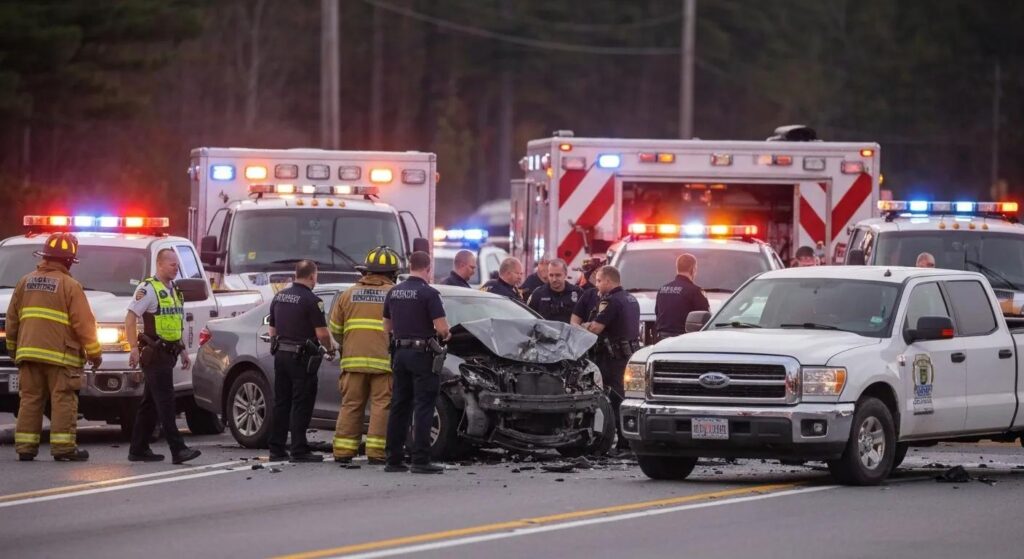Car accident laws in Massachusetts involve a complex blend of insurance rules, fault determinations, filing deadlines, and compensation calculations that every motorist should understand. Under the state’s modified no-fault system, Personal Injury Protection (PIP) ensures prompt medical and wage coverage without proving fault, while comparative negligence and strict statutes of limitations dictate when and how much you can recover. This guide will unpack:
By mastering these core concepts, you can protect your rights, navigate the claims process with confidence, and evaluate when the advocacy of Kiley Law Group may enhance your recovery.

Massachusetts’s no-fault car insurance system provides immediate coverage for medical expenses and lost wages through Personal Injury Protection (PIP), regardless of who caused the crash. This mechanism reduces delays in obtaining treatment and mitigates financial hardship after an accident. For example, injured drivers can receive up to $8,000 in medical benefits without first establishing another party’s fault, preserving their health and livelihoods while claims are processed.
Personal Injury Protection (PIP) is mandatory coverage in Massachusetts auto policies that pays for medical care, up to $8,000, and lost wage benefits up to $15 per day. Covered expenses include:
PIP allows injured parties to focus on recovery immediately, and it serves as the first layer of financial protection before liability is determined.
Massachusetts law requires all drivers to carry minimum liability and PIP coverages to protect victims and other road users. The table below summarizes these mandates:
| Coverage Type | Required Minimum | Purpose |
| Bodily Injury per person | $20,000 | Compensates injury-related expenses |
| Bodily Injury per accident | $40,000 | Protects against multiple injuries |
| Property damage | $5,000 | Covers vehicle and property repair |
| Personal Injury Protection | $8,000 (medical), $15/day lost wages | Ensures quick treatment and income support |
A formal lawsuit is permitted when injury costs exceed PIP limits or when the harm qualifies as “serious.” You may step outside the no-fault system if:
Exceeding these thresholds triggers the right to pursue full negligence claims for additional damages beyond PIP.
PIP benefits serve as a primary source of payment, reducing out-of-pocket costs and establishing an official record of treatment and wages lost. When you later pursue a negligence claim, documented PIP claims demonstrate incurred expenses and losses, strengthening evidence of harm. However, reimbursements made under PIP may be subject to subrogation if you recover those amounts in a settlement.
Victims often wonder whether PIP applies if they were partially at fault or uninsured at the time of a crash. The key clarifications include:
Understanding these points prevents surprises during the claims process and lays the groundwork for determining further compensation.
Modified comparative negligence in Massachusetts reduces a victim’s compensation by their percentage of fault and bars recovery entirely if the victim is 51 percent or more at fault. This doctrine balances responsibility by ensuring that each party bears the financial consequences of their actions. For instance, a driver found 30 percent at fault for a collision would see a 30 percent reduction in award amounts for medical bills and pain and suffering.
Under M.G.L.A. 231 § 85, any claimant whose share of fault is 51 percent or greater cannot recover damages. This threshold incentivizes thorough evidence gathering to minimize perceived fault and underscores the importance of an accurate determination of responsibility.
Proving negligence involves establishing duty, breach, causation, and damages. Key evidence includes:
Each piece of evidence clarifies how fault percentages should be assigned and influences comparative negligence calculations.
Compensation is calculated by first determining total damages – —medical bills, lost wages, and pain and suffering – and then subtracting the claimant’s fault percentage. For example, $100,000 in total damages reduced by 20 percent fault yields an $80,000 award.
Recognizing these patterns helps victims and their attorneys anticipate fault arguments and prepare stronger cases.
Massachusetts imposes a three-year deadline under M.G.L.A. 260 § 2A for filing personal injury lawsuits arising from car accidents. This period begins on the date of the collision and ensures timely resolution of claims. Missing this deadline typically results in the loss of your right to sue for damages.
Victims must initiate legal action within three years of the accident date or risk forfeiting recovery. This strict timeline applies uniformly to bodily injury claims, reinforcing the need for prompt case evaluation after a crash.
Wrongful death actions under M.G.L.A. 229 § 2 must be filed within three years of the decedent’s date of death. The deadline focuses on the date of death rather than the accident date, often coinciding with the same three-year period but occasionally extending if death occurs after the crash.
Awareness of these exceptions ensures that rights are preserved even in complex situations.
Securing safety and establishing evidence are critical first actions after a crash. Promptly assessing injuries, alerting authorities, and documenting the scene protect your health and future claim. For example, calling emergency services ensures required police responses and medical attention.
These steps create official records and preserve statutory compliance under Massachusetts law.
If no police report is generated, drivers must submit a RMV Motor Vehicle Crash Operator Report form to the Registry of Motor Vehicles within five days. This document records the accident’s basic facts and satisfies state reporting requirements.
What Evidence Should You Collect After a Massachusetts Car Accident?
Photograph vehicle damage from multiple angles, capture road conditions, and note skid marks. Obtain names and contact details of passengers and witnesses. Secure a copy of the police report once available to support fault and injury claims.
Provide only factual details – date, time, location, and observed damage – —while avoiding speculative statements about fault or injuries. Record all claim numbers, adjuster names, and correspondence dates. This disciplined approach prevents inadvertent admissions and preserves negotiation leverage.
A settlement typically covers economic and non-economic damages arising from negligence. Economic damages reimburse quantifiable losses such as medical expenses and lost income, while non-economic damages compensate for pain and suffering and emotional distress. This dual structure ensures both tangible and intangible harms are addressed.
Victims may claim:
Each category requires documentation or credible testimony to substantiate the value sought.
Settlement ranges in Massachusetts vary widely: minor injuries average around $6,965, moderate injuries around $77,447, and severe injuries can exceed $600,000. These figures reflect medical treatment intensity, recovery time, and impact on daily life.
Maximizing recovery involves strategically aligning these factors through persuasive negotiation or litigation.
Experienced attorneys guide clients through procedural requirements, collect and present compelling evidence, and negotiate assertively with insurers. By articulating economic losses and demonstrating pain and suffering, legal counsel often secures significantly higher settlements than victims achieve on their own.
Different crash types invoke unique legal considerations under Massachusetts law. Examining common scenarios reveals how no-fault thresholds, fault allocation, and uninsured motorist protections operate in practice.
Rear-end crashes often trigger presumptions that the following driver was at fault for failure to maintain a safe distance. Evidence such as brake lights, skid marks, and witness testimony helps confirm liability, enabling affected drivers to recover both PIP benefits and excess damages.
Distracted driving – —such as texting while driving – constitutes negligence per se when it violates state statutes. Establishing that a driver’s inattention directly caused the crash can shift fault percentages and enhance recoverable damages for victims.
Uninsured motorist coverage compensates victims when at-fault drivers lack sufficient liability insurance. Policyholders receive equivalent protection to their own liability limits, ensuring victims are not left without recourse.
In a recent anonymized case from October 2025, an injured passenger secured a $150,000 settlement after a multi-car pileup by demonstrating serious injury thresholds and leveraging comparative negligence arguments. Real-world examples like this illustrate the interaction between no-fault exceptions, fault percentages, and negotiation strategies.
Insurance carriers employ various methods to limit payouts, including early lowball offers, incomplete investigation tactics, and emphasizing claimant fault. Recognizing these strategies empowers victims to protect their rights and demand fair compensation.
Awareness of these approaches helps clients respond effectively.
Clear documentation of medical treatment and daily impairments strengthens negotiating positions.
Consider representation when injuries exceed minor strains, liability is contested, or an insurer’s initial offer fails to cover documented losses. Early involvement of counsel preserves evidence, meets critical deadlines, and positions victims for maximum recovery.
Kiley Law Group combines specialized knowledge of Massachusetts car accident statutes with aggressive negotiation skills to challenge lowball offers and highlight full damages. By meticulously compiling medical records, expert analyses, and fault evidence, the firm advocates for clients’ rights at every stage of the claim process.
Victims of Massachusetts car accidents can rely on clear legal pathways and protective insurance frameworks to secure compensation for their losses. Understanding no-fault insurance, comparative negligence rules, and filing deadlines is the first step toward preserving health, finances, and legal rights. Prompt evidence collection, strategic communication with insurers, and the guidance of experienced Massachusetts attorneys help ensure that recovery aligns with the true extent of injuries and damages. For individuals seeking comprehensive support, Kiley Law Group offers dedicated representation to navigate state laws, negotiate effectively, and pursue maximum compensation on behalf of injured motorists.
If you are involved in a hit-and-run accident, prioritize your safety and seek medical attention if needed. Document the scene by taking photos and noting any details about the other vehicle, such as its make, model, and license plate number. Report the incident to the police as soon as possible, providing them with all the information you gathered. Additionally, contact your insurance company to discuss your options, including potential claims under your uninsured motorist coverage.
Proving fault in a Massachusetts car accident requires gathering evidence that establishes negligence. This includes obtaining police reports, collecting witness statements, and documenting the accident scene with photographs. Additionally, expert testimony may be used to clarify the mechanics of the accident. The burden of proof lies with the claimant, so comprehensive documentation is essential to support your case and demonstrate the other party's liability.
Failing to report a car accident in Massachusetts can lead to serious consequences, including fines and penalties. If the accident results in injury or property damage exceeding $1,000, you are legally required to file a report with the Registry of Motor Vehicles. Not reporting can also jeopardize your ability to claim insurance benefits and may weaken your position in any potential legal proceedings.
Yes, in Massachusetts, you can still recover damages even if you were partially at fault due to the modified comparative negligence rule. However, your compensation will be reduced by your percentage of fault. For instance, if you are found to be 20% at fault for the accident, your total damages will be reduced by that percentage. It’s crucial to gather evidence to minimize your perceived fault to maximize your recovery.
After a car accident, your medical bills can be covered under Personal Injury Protection (PIP) in Massachusetts, which pays up to $8,000 for medical expenses regardless of fault. It’s important to keep all medical records and bills organized, as these documents will be essential for your claim. If your medical expenses exceed PIP limits, you may pursue additional compensation through a negligence claim against the at-fault party.
In Massachusetts, car accidents involving pedestrians are treated with a focus on the duty of care owed to pedestrians. Drivers are expected to yield to pedestrians in crosswalks and exercise caution in areas where pedestrians are present. If a pedestrian is injured, they may file a claim against the driver for damages. However, if the pedestrian is found to be at fault, comparative negligence rules will apply, potentially reducing their compensation based on their level of fault.
Hiring a car accident attorney in Massachusetts can significantly enhance your chances of receiving fair compensation. An experienced attorney understands the complexities of state laws, can navigate the claims process efficiently, and will advocate on your behalf against insurance companies. They can help gather evidence, negotiate settlements, and represent you in court if necessary, ensuring that your rights are protected and that you receive the maximum compensation for your injuries and damages.
Understanding Massachusetts car accident laws empowers victims to navigate the complexities of insurance claims and legal rights effectively. By leveraging no-fault insurance, comparative negligence principles, and timely legal representation, individuals can secure fair compensation for their injuries and losses. Taking proactive steps after an accident, such as gathering evidence and consulting with experienced attorneys, is crucial for maximizing recovery. For personalized guidance and support, reach out to Kiley Law Group today. If you’ve been injured in an accident in Massachusetts or New Hampshire, contact the car accident attorneys at Kiley Law Group today for a free consultation.

